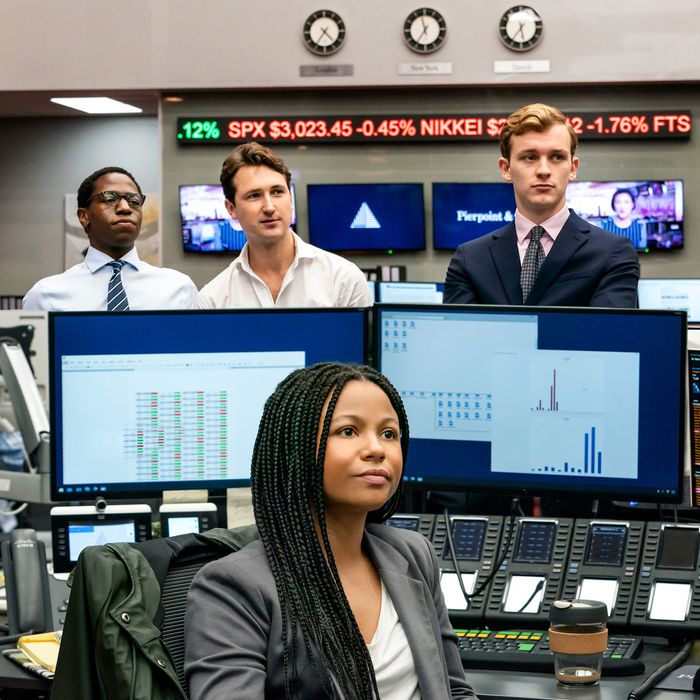
The main character in Industry, the new HBO drama from Mickey Down and Konrad Kay, is a young woman named Harper Stern, played by Myha’la Herrold. Harper is a brand new employee of Pierpont & Co, a powerful financial firm headquartered in London, and as a Black American woman, she arrives with a fair amount of culture shock. She’s brilliant, and she’s helped by her mentor Eric (Ken Leung), a fellow American who’s ushered her into the fold. But Harper has a Suits-esque secret and some major cultural adjustment to do, and as Industry makes plain from the jump, Harper and her fellow new employees have jumped into a high-pressure, high-reward environment.
From that description alone, you can probably piece together some of Industry’s major influences and predecessors. There’s an unmistakable Shonda Rhimes feel to the group of eager, talented newbies who’ve landed in a forbidding, high-stakes workplace. There’s also the Suits element, and then the shots of Bloomberg terminals and branded fleece vests and bits of dialogue where people yell things about high-yield packages and hedging against the housing market and leveraging one’s position will call to mind the macho finance men of Billions. It’s a compelling logline on paper: Grey’s meets finance set in London with a woman of color in the lead role.
Translated onto the screen, Industry mostly meets the brief. There are moments when it all gels and the show really comes into its own, especially in episode four (the last of the screeners sent to critics). Harper’s fellow new hires start to gain some personality: Yasmin (Marisa Abela) gets treated as the coffee girl and resents Harper’s ability to sidestep some of the misogyny, two of the male employees are in a secret relationship with one another, class and money and educational hierarchies abound.
But four episodes in, the show still feels like a sewn-together sum of those parts rather than something that’s gained its own internal spark of motivation. The biggest problem is Harper, who’s deliberately reserved because she feels so out of place among Pierpont’s wealthy upper-class snobs, but whose reserve often comes off as thin, underconfident characterization. When she finally makes a drastic, dangerous choice in the fourth episode, Harper snaps into focus a bit more, but most of her qualities are still defined by her environment rather than by who she is outside of Pierpont. Harper’s first significant moves in Industry are to protect the secret of her missing qualifications, but Industry doesn’t go into how she landed at Pierpont or why she was willing to make that kind of risk. It’s implied, sure, and I can’t say I long for lengthy “How’d she get here?” flashback scenes. Still, I wonder if having more grounding in Harper’s pre-show history would’ve helped define the character better.
The most distinctive thing about the show is its aesthetic, defined largely by the pilot episode directed by Lena Dunham. The core of the show sounds soapy, maybe even in a big-three network kind of way — hot young finance people have a lot of sex with one another while scrambling to the top of the corporate ladder. The direction, though, lathers on that HBO sensibility. I know it rains a lot in London, but Pierpont is an inexplicably gray place, with colors leached out of the lights and skin tones. It’s also busy and loud. There’s a perpetual background hum, a constant buzzing of computer terminals and half-heard conversations and even nearby breathing. It’s a purposeful effort to turn Pierpont into a bustling, stressful hub of ever-present competitors, but in practice it means that the deluge of financial buzzwords are even harder to make out amid the din. Screeners often lack subtitles; I longed for them.
Time and again, the most compelling scenes were those between Harper and Eric, her boss-mentor. In spite of Industry’s faults, and even though much of the show feels underbaked, the relationship between them manages to stretch beyond the familiar boss stereotypes. Eric is neither overly cruel nor goopily supportive, and Harper seems more capable of being herself in his company than she is in any other context on the show. He prods and chides her, sometimes curtly and sometimes compassionately. As another American and person of color in the unbearably classist finance world, they see themselves as allies, but this also makes Eric more sensitive to Harper’s inexperience and her discomfort in standing up for her ideas. He wants her to do well for her sake, but he wants it for his own sake, too. They’ve been thrust together by choice but also not by choice, and they both appreciate and resent it.
It’s the most complex relationship on a show that could desperately use some more complex relationships, and maybe with time Industry will find them. Right now, though, it’s much lighter than its gray colors and fast-paced money yelling and intense stress suggests. There’s a traumatic and surprising event in the first episode that’s meant to establish the stakes, but the next several episodes struggle to live up to them. It’s all full frontal nudity and credit-default swaps and lines of coke to celebrate a birthday, and not enough solid character work or outright fun.
"industry" - Google News
November 12, 2020 at 10:48PM
https://ift.tt/3noQKop
Industry Trades On Known Quantities - Vulture
"industry" - Google News
https://ift.tt/2RrQtUH
https://ift.tt/2zJ3SAW
Bagikan Berita Ini














0 Response to "Industry Trades On Known Quantities - Vulture"
Post a Comment